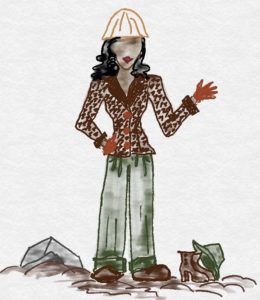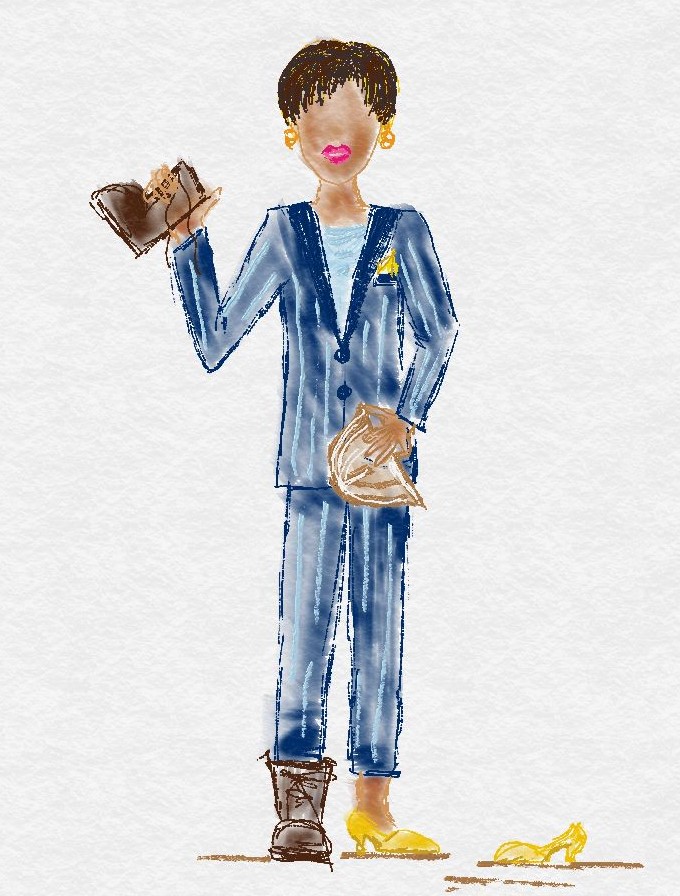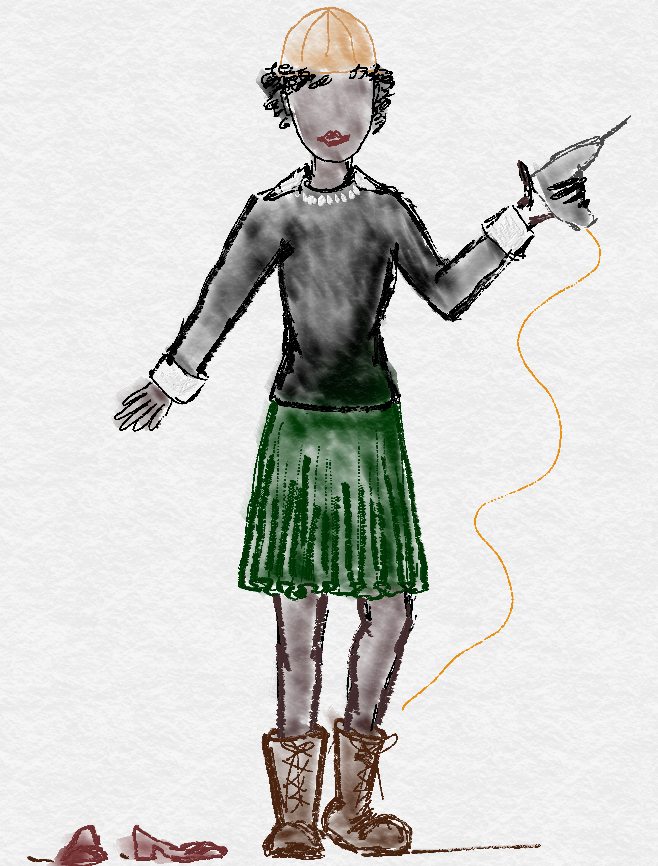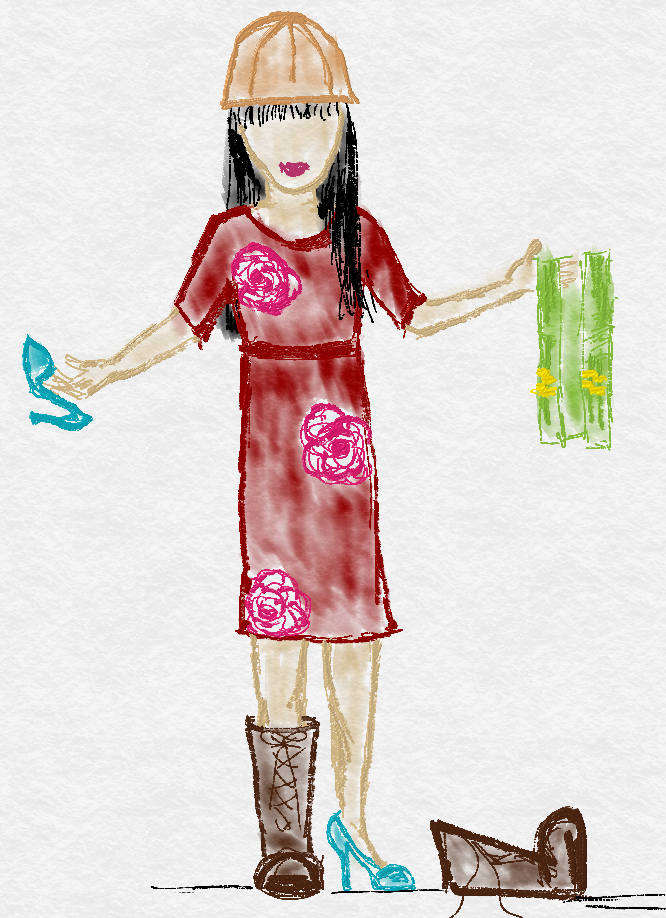Emotional Factor of Safety
Crying At Work (About Work) Isn’t Okay
Women are often stereotyped as being emotional, flighty, weak, and thinking with their hearts and not with their heads. Men can be portrayed this way too- if a man tears up at an emotional scene he is “in touch with his feminine side”.
Engineers and scientists on the other hand, are typecast as being analytical, impartial, and unemotional.
So women can’t be engineers and scientists then right? It just wouldn’t work out. How can a woman focus on calculations or problem solving when she is feeling sorry for the client who now needs 6 ft rather than 5 ft diameter shafts?
I have seen women in my profession intentionally present a starkly unemotional image. They put a Factor of Safety on sensitivity and overcompensate to the other extreme to appear stoic and reserved. This may be because they think that will fit in better, that they prefer to keep their feelings private, or that they are worried about making others in that environment uncomfortable.
I don’t object to any of that. If you truly have a reserved personality, I am not implying that change is needed. But if you are suppressing your sensitivity, do yourself and your co-workers a favor: to thine own self be true!
You: In-Situ
I believe that one peripheral reason why women are leaving the STEM field is because not only do they feel that they can’t express their true personality at work, but they feel that male co-workers won’t understand or care about their lives outside of work.
How often do we hear the catchphrase “work/life balance”? I might as well continue with the stereotypes on how each generational group in the workforce interprets this catchprase. Baby Boomers are too busy industriously working to stop to think about that question… Gen Xers are content with getting in a round of golf, a pedicure, or a family outing over the weekend before heading back to the grind on Monday. To Millennials it means to build a wall between the two; leave work at work and home at home and fiercely defend your personal life and time. But perhaps an unintended effect of this attitude is that Millennials feel stifled and mechanical in the workplace. This strategy may work in a more solitary, fixed-hour profession, but most of us in the geotechnical field spend over 50 hours per week on the job, whether in an office, on a project site, or traveling and meeting with clients.
So I say: it’s okay to be you. Even in the office. The more you show who you are (while remaining professional) the better you are going to perform as part of a team. It will also be easier for team leaders to understand how to utilize your strengths. A colleague recently pointed out to me that when you hire someone, you can’t pick and choose which of their qualities you get. You can’t have their strong analytical abilities but not their shyness, or their great public speaking skills but not their tendency to get stressed about deadlines. So rather than suppress your personality traits, follow this year’s Girl Scout cookie slogan “Be Unique, Be You.”
I don’t know if what I said earlier about Millennials is accurate- after all, I am not one of them, but I am advocating for breaking down the wall between your profession and your personal life. If we share our struggles and triumphs then workplace communication will improve and lead to better problem solving and increased productivity which often translates into profitability and who can complain about that?
So share the 10K you are training for, the videos of your kid making that adorable noise, or that you binge-watched episodes of The Walking Dead all weekend.
I believe we should also share the hardships that we face in our personal life as well. This is an extreme example, but it’s something that I think we need to talk more about as a society anyway, so I’m plunging ahead. Between babies #2 and #3 I had a miscarriage. It was heartbreaking and very emotionally draining. I debated telling my supervisor and the managers of projects I was working on. I knew another co-worker had experienced two miscarriages but chose not to say anything. Ultimately I decided it was the right thing for me to do. I wasn’t asking for special treatment or time off. I was looking for support and understanding, and I was overwhelmed with the outpouring of compassion that I received. It really made the situation easier to handle, and I didn’t have to hide my feelings and emotions and pretend that everything was okay.
There’s No Crying in Stratigraphy
Having said all of this, I will now present the other part of my dichotomous message: “Please don’t cry about work while at work!” As a member in good standing of Criers Anonymous, trust me when I say that I understand the magnitude of what I am asking. My eyes fill with tears when veterans march by in the community Fourth of July parade, and when I see my kids meet Peter Pan at Disney World, or when something reminds me of my grandmother who passed 11 years ago. I cry at both happy and sad things and most often when I am tired and/or frustrated.
So I understand. You’ve put a lot of time into that concrete beam design. You’ve brought it home for the past two nights to work on and checked and double checked your calculations to account for the high shear forces. But now at the last minute, the project manager decides to go with a steel beam instead and you will be at the office until midnight redoing the calculations yet again.
I don’t care what you need to do to prevent it, but put forth a great effort not to cry in front of your co-workers (in particular your supervisor) about work. Take a quick break, excuse yourself to run out and grab a cup of coffee, or if you’re Peggy, a new shade of lipstick at the drug store. Turn on the waterworks if it will help relieve some of your tension while you take a little break, but return to get the job done.
Sometimes you don’t have the luxury of a quick escape. You are stuck in a meeting or a one-on-one performance evaluation with your supervisor where you are facing criticism. Try your best to remain professional and not get caught up in the emotions of the situation.
My rationale for this supplication is that people react in a variety of ways when they see another person get emotional- from pity and sympathy to annoyance and disgust. For you it may be a way to release your feelings and end up refreshed and ready to tackle the next problem. It may be a tool that you use to prevent frustration from building. But by crying in the workplace about work issues you are distancing yourself from your co-workers, both female and male. Your crying can be interpreted as manipulation, or that you are too stressed to adequately perform your job. It may come across as immaturity or trying to evoke sympathy from a female or male superior.
Humans, both male and female, can be affected by extreme displays of emotion. Someone with a flaring temper can be intimidating and aggravating to those around them. The co-worker who is consumed with persistent indignation about their underserved bad fortune can be a distraction and an annoyance to others. One male colleague confessed to me his inability to think straight if a woman came to him crying about a technical issue she didn’t understand, for example. He couldn’t help but think of his mother and his sister and be overwhelmed with empathy. He would provide assistance, even to the detriment of his own deadlines. Afterward he felt resentment about the situation because he felt exploited, particularly if it happened repeatedly.
A couple of years ago, I worked on a very complex support of excavation design for a property owner. It took weeks to complete; the time commensurate with the level of risk involved. The project was intense and I spent many hours conversing with the structural engineer and the owner, educating them on the design assumptions we were making. Because of the time-sensitive nature of the project and construction finesse required, we recommended a specific specialty contractor that we trusted to handle the complexities of the project. When the contractor came on board, they told the owner they could redesign the excavation support more efficiently. We explained to the owner that the design could certainly be completed effectively with less retaining force, but considering the myriad variables involved, we recommended the more robust system. At the very least, if the contractor’s proposed system was used, the instrumentation monitoring program should be expanded. The owner elected to do neither, and hired the contractor to redesign the support of excavation. When I found out, I was furious and so upset that I burst into tears. I cried to my supervisor and co-workers and anyone who would listen. I was moody and depressed about it for a week. I vowed never to speak to anyone from the offending firm. Looking back, I wish I had not made such a scene. After all, business is business and ultimately it was the owner’s decision to make. We got paid for our work and have continued to work with all parties involved on other endeavors. But I know that I negatively impacted some of my co-workers’ opinions of me, particularly the staff that assisted me on the project. Since then, I have made an effort to rein-in my emotions on project-related efforts and set a better example.
So, bring your true self to the office but enough of that sniveling, buck up and join me in this No Crying Zone. If you disagree, I’d love to hear it…I’ll just try not read your comments while watching videos of soldiers returning home to surprise their children.




2 Responses to Emotional Factor of Safety